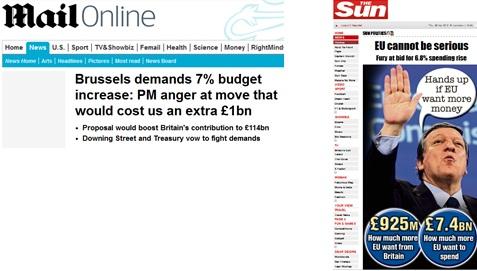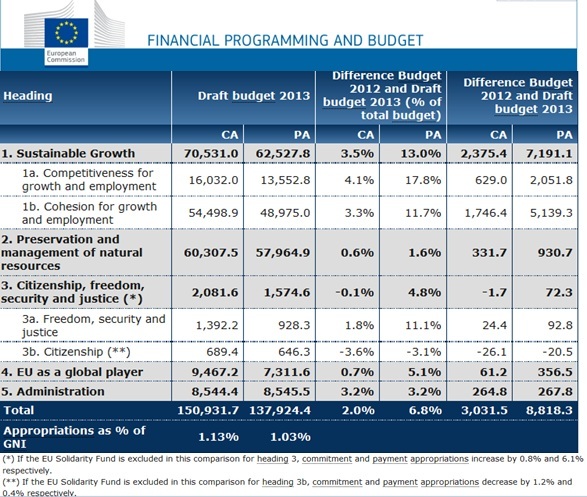Is the EU budget increase all that it seems?
Now that the EU referendum has been set for June 23rd, we will be bringing you new factchecks and explainers on topics ranging from immigration to trade. We will also be going over all of our older content on Europe and the EU to make sure it's ready for voters.
Some posts will be rewritten, others will be kept up for historic interest or archived. This is one of the posts we'll be reviewing.

Earlier this week, the European Commission presented the EU's draft budget for 2013, immediately provoking a veritable storm of discussion across the media:
Daily Mail: "Brussels demands 7% budget increase: PM anger at move that would cost us an extra £1bn"
The Sun: "EU cannot be serious. Fury at bid for 6.8% spending rise"
However some readers could have been left confused when the Mail said:
"Proposal would boost Britain's contribution to £114bn"
But later on in their article said:
"the Commission's proposal would increase the EU's budget by 6.8 per cent to nearly £114billion. Britain's share, at around 12.5 per cent, would be £16.6billion — a rise of more than £1billion."
The Sun also claims that the EU's budget will increase to £113.6billion, and the contribution made by Britain to the budget will increase by £925million to around £14.2billion.
So how can we make sense of these figures?
The fact that the EU budget is set to rise by 6.8 per cent (which the Mail rounds up to 7) is taken from a recent press release from the European Commission.
However, this is not as simple as it might seem. The EU budget has two types of considerations, 'Commitments' (values it has committed to paying out) and 'Payments' (outstanding amounts that need to be paid from previous agreements).
The draft budget for 2013 includes, according to the EU, "€150.9 billion in commitments, a 2% increase on last year, in line with the current inflation rate". Payments represent "€137.9 billion which amounts to an increase of 6.8%" (see table below).
Using currency conversions at the time of writing, this amounts to £123.19 billion in 'commitments', and £112.58 billion in 'payments'.
This represents a rise from €129.1 billion of payments in last year's budget (~£105 billion) and €147.2 billion in commitments (~£120 billion), amounting to £3.02 billion (commitments) and £7.18 billion (payments).
The matter of Britain's contribution to the EU budget is murkier. Each member country's contribution comprises three different parts: a fixed percentage of GNI (Gross National Income), plus customs duties collected on behalf of the EU, plus a percentage of their VAT income.
After contacting both newspapers for the source of their contribution figures, the Sun were unable to disclose their sources and the Mail were unsure as to where the figures had been acquired from. Full Fact has contacted the EU commission for more details and will update when we have more information.
Certainly, however, neither article factors in the UK rebate, which sees the UK reimbursed by 66 per cent of the difference between what it paid to the budget and what it got back. This saw Britain, for instance, receive back €4 billion in 2010.
So what can we take away from these reports? The European Commission Office in London explained to Full Fact that the 6.8 per cent 'increase' in the budget is only half the story.
The 6.8 per cent increase applies only to 'Payments' - i.e. footing outstanding bills for previous projects. According to the Commission this is similar to the functions of a 'credit card', where states have paid for past projects and the bill for those schemes is now due.
However, what is noteworthy is that the draft EU budget for 2013 freezes 'Commitments' (and thus future expenditure) at the level of inflation (2%). It also freezes the Commission's administrative budget below inflation, "while cutting its staff by 1%, the first step towards the goal of a 5% reduction of staff in 5 years."
So the seven per cent rise in the EU budget should not be taken immediately at face-value. The figure only applies to footing the bill for past expenditure rather than budgeting for future spending commitments.
It does seem, however, that the Mail was in error to place the £114 billion figure as the UK's contribution in the sub-heading of their article.
